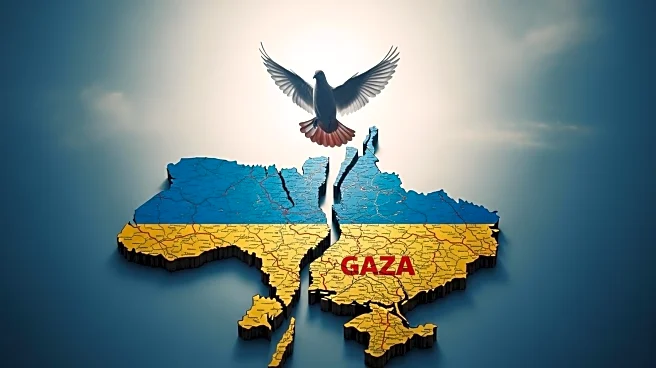What's Happening?
President Trump is facing challenges in his peace efforts as conflicts in Ukraine and Gaza continue to escalate. Despite a recent summit with Russian leader Vladimir Putin, Trump expressed disappointment over the lack of progress in Ukraine, stating that Putin 'let me down.' In the Middle East, Israeli Prime Minister Benjamin Netanyahu has launched a new offensive in Gaza, complicating diplomatic negotiations hosted by Qatar, a U.S. ally. Trump’s attempts to project confidence on the international stage are contrasted by the ongoing turmoil in these regions, raising questions about his diplomatic strategies and the effectiveness of his administration's foreign policy team.
Why It's Important?
The faltering peace efforts have significant implications for U.S. foreign policy and international relations. The escalation in Ukraine and Gaza could affect global stability and U.S. diplomatic standing. Trump's approach to foreign policy, characterized by bold gestures, faces criticism for lacking experienced diplomatic support. The situation in the Middle East, particularly Israel's actions, may strain U.S. relations with Arab nations and challenge the strategic balance in the region. In Europe, Trump's equivocal stance towards Putin and the ongoing conflict in Ukraine could impact NATO dynamics and U.S.-Russia relations.
What's Next?
As the U.N. General Assembly approaches, Trump and his administration are likely to face increased scrutiny and criticism from international leaders. Arab nations may demand a shift in U.S. policy towards the Middle East, seeking stronger support against Israeli military actions. In Europe, heightened tensions due to Russian incursions into NATO airspace could lead to calls for more decisive U.S. action. The administration's ability to navigate these complex geopolitical challenges will be crucial in shaping future diplomatic outcomes.
Beyond the Headlines
The ongoing conflicts highlight deeper issues in U.S. foreign policy, including the need for a cohesive strategy and experienced diplomatic leadership. Trump's reduction of the National Security Council staff and reliance on a small team for foreign policy decisions may hinder effective coordination and response to international crises. The situation also underscores the ethical and strategic dilemmas faced by the U.S. in balancing support for allies with broader regional stability.










